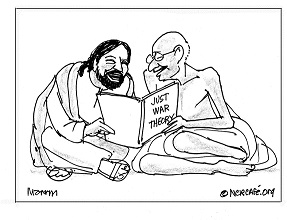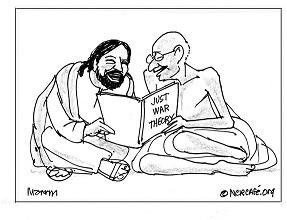

“I am sending you like sheep in the midst of wolves; so be shrewd as serpents and simple as doves” (Matt 10:16).
We celebrate individuals who have brought about major changes in what seemed like intractable social evils. Imagine how Gandhi felt as he faced the occupying British Empire in India. Or Dr. Martin Luther King Jr, as he considered how to bring down the legal and social barriers to racial equality in the United States.
Or imagine us today, as we lament the humanitarian crisis at the border, the uphill struggle for a decrease in gun violence, or an end to abuse crisis and cover up in the church. Where to begin and what to do to make a meaningful difference in the interlocking crises caused by fear and selfishness in our world?
Jesus not only had a message but also a method as he formed his disciples to be missionaries to a world filled with wolves on the prowl for sheep. He is a realist, and he knows that the Gospel of peace and justice will appear naïve and impractical in a rough world. He proposes a strategy of confronting the consciences of oppressors, truth to power. He counsels his followers not to meet hate with hate, violence with violence, but to remain transparent, straightforward and direct in the cause of justice and truth.
In 2000, a book titled “A Force More Powerful” by Peter Ackerman and Jack Duvall told the neglected history of nonviolent movements that averted wars, overthrew dictators and secured human rights by using the courts, promoting dialogue, mounting public protests, strikes and boycotts. Failure to consider these options and a lack of general awareness of how effective they have been supports the lie that the use of force is the only way to solve problems.
Jesus was also realistic in telling his disciples that the cost of their efforts to bring peace and justice would be high. The powers that conspired to kill him used the logic that it was better for one man to die than for the system to fall. His crucifixion toppled that logic with the truth that the death of an innocent man has more power in history than all the forces of deception and injustice.
The Gospel is, of course, filled with paradoxes that must be experienced to be validated. Nonviolent resistance to evil is one of these paradoxes, and it is quickly dismissed as a concept applied to this or that aggression. If Gandhi, King, Romero, Tutu or Mandela had stopped there, there would have been no historic change. If the hundreds of heroes opposing injustice today accepted the status quo as too big and too powerful, there would be no social change.
The call to discipleship begins with prayer and total trust. Jesus is asking, “Where are my lambs? Where are my doves?” There is work to be done.
Advertisement







